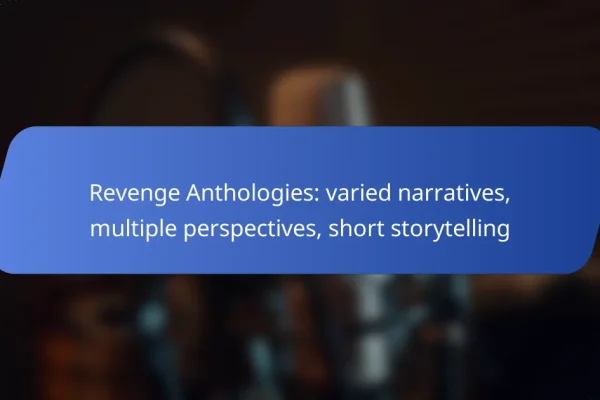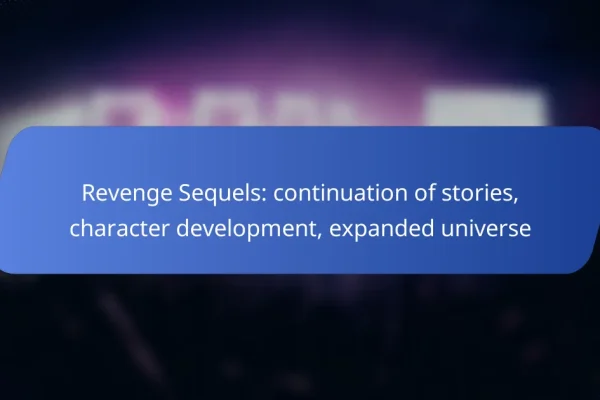Why should you watch revenge films in Canada?
Watching revenge films in Canada offers a unique blend of thrilling narratives and emotional depth that resonates with audiences. These films often explore themes of justice and morality, making them compelling choices for viewers seeking intense storytelling.
Engaging storytelling
Revenge films are known for their gripping plots that keep viewers on the edge of their seats. They often feature a protagonist who embarks on a quest for vengeance, leading to unexpected twists and turns. This narrative structure not only captivates but also invites audiences to reflect on the motivations behind each character’s actions.
In Canada, filmmakers have embraced this genre, producing local revenge stories that resonate with cultural nuances. Examples include films that incorporate Canadian landscapes and social issues, enhancing the storytelling experience.
Emotional catharsis
Revenge films provide a powerful outlet for emotional release, allowing viewers to confront feelings of anger, betrayal, and justice. The journey of the protagonist often mirrors personal struggles, enabling audiences to experience catharsis through the character’s triumphs and failures.
This emotional engagement can be particularly impactful in a Canadian context, where themes of justice and retribution may resonate with societal values. The intensity of these films can lead to discussions about morality and the consequences of revenge.
Cultural reflection
Revenge films often serve as a mirror to societal issues, reflecting cultural attitudes towards justice and retribution. In Canada, these films can highlight the complexities of the legal system and the moral dilemmas faced by individuals seeking revenge.
By exploring local narratives, Canadian revenge films can provoke thought about the implications of vengeance in a multicultural society. This reflection encourages viewers to consider the broader consequences of revenge, both personally and socially.
What themes are common in revenge films?
Revenge films often explore themes such as justice, morality, isolation, and alienation. These narratives typically focus on characters seeking retribution for wrongs done to them, raising questions about the nature of justice and the emotional toll of vengeance.
Justice vs. morality
The tension between justice and morality is a central theme in revenge films. Characters often grapple with the legality of their actions versus their personal sense of right and wrong. For example, a protagonist may seek to punish a wrongdoer outside the law, leading to moral dilemmas about whether their actions can be justified.
This theme prompts viewers to consider the consequences of taking justice into one’s own hands. While the desire for revenge can be strong, it often leads to further violence and moral ambiguity, challenging the audience to reflect on the true meaning of justice.
Isolation and alienation
Isolation and alienation frequently accompany characters in revenge narratives. As protagonists pursue their vendettas, they often find themselves distanced from friends and family, leading to a profound sense of loneliness. This emotional isolation can intensify their quest for revenge, as they may feel that no one else understands their pain.
The portrayal of isolation serves to highlight the psychological impact of vengeance. Characters may become consumed by their desire for retribution, which can further alienate them from society and lead to tragic outcomes. This theme resonates with audiences, emphasizing the personal costs associated with the pursuit of revenge.
How do revenge films impact viewers?
Revenge films significantly impact viewers by evoking strong emotional responses and prompting reflection on justice and morality. These films often explore themes of vengeance, leading audiences to confront their own feelings about retribution and fairness.
Empathy development
Revenge films can enhance empathy by allowing viewers to experience the protagonist’s journey and motivations. As audiences witness the struggles and pain of characters seeking vengeance, they may develop a deeper understanding of complex emotions such as anger, betrayal, and loss.
This emotional engagement can lead to greater compassion for those who have faced similar injustices in real life. By connecting with the characters, viewers might reflect on their own values and the consequences of revenge, fostering a more nuanced perspective on human behavior.
Adrenaline and excitement
Revenge films often deliver high levels of adrenaline and excitement through intense action sequences and dramatic plot twists. The thrill of watching a character pursue justice can create a captivating viewing experience, keeping audiences on the edge of their seats.
These films frequently incorporate suspenseful elements, such as unexpected betrayals or climactic confrontations, which heighten emotional investment. This combination of action and narrative tension can lead to a satisfying release of pent-up energy, making revenge films a popular choice for those seeking an exhilarating cinematic experience.
Which popular revenge films should you watch?
Several revenge films have garnered critical acclaim and a strong following. Notable titles include “Oldboy,” “Kill Bill: Vol. 1,” and “The Revenant,” each offering unique narratives and intense emotional experiences.
Oldboy (2003)
<p"Oldboy" is a South Korean film that tells the story of a man inexplicably imprisoned for 15 years, who seeks vengeance upon his release. The film is renowned for its intricate plot and shocking twists, making it a standout in the revenge genre.
Viewers should be prepared for intense themes and graphic violence, which contribute to the film’s powerful impact. The film’s exploration of revenge raises questions about morality and the consequences of one’s actions, making it a thought-provoking watch.
Kill Bill: Vol. 1 (2003)
“Kill Bill: Vol. 1” is directed by Quentin Tarantino and follows a former assassin seeking revenge on her ex-colleagues after they betray her. The film is celebrated for its stylish direction, vibrant cinematography, and a mix of martial arts and Western influences.
With a strong female lead and memorable fight scenes, this film combines action with a compelling narrative. Viewers should note the film’s unique storytelling style, which includes non-linear timelines and homages to various genres.
The Revenant (2015)
“The Revenant” features Leonardo DiCaprio as a frontiersman who is left for dead after a bear attack and embarks on a quest for revenge against those who abandoned him. The film is notable for its stunning cinematography and immersive storytelling, which captures the harsh realities of survival.
Audiences can expect a slow-burn narrative that emphasizes the protagonist’s struggle against nature and betrayal. The film’s visceral portrayal of revenge serves as a commentary on human resilience and the lengths one will go to reclaim their life.
What are the psychological effects of watching revenge films?
Watching revenge films can elicit strong psychological responses, including heightened emotions and reflections on justice. These films often tap into deep-seated feelings about morality, fairness, and the desire for retribution, which can lead to various psychological effects.
Increased aggression
Revenge films frequently portray violent scenarios that can lead to increased aggression in viewers. Research suggests that exposure to violent media can desensitize individuals to aggression and normalize violent behavior. This effect may vary based on personal experiences and predispositions, with some viewers feeling more aggressive after watching such films.
For instance, a viewer might feel a surge of anger or frustration after witnessing injustices in a film, potentially influencing their real-life interactions. It’s important to recognize these feelings and consider how they might affect behavior outside of the viewing experience.
Empowerment feelings
On the flip side, revenge films can also evoke feelings of empowerment in viewers. The narrative often centers around a protagonist who takes control of their fate, which can resonate with individuals facing their own challenges. This sense of agency can be particularly appealing and may inspire viewers to confront their own adversities.
For example, someone who feels powerless in their daily life might find motivation in a character’s journey of vengeance, leading to a temporary boost in self-esteem. However, it’s essential to balance these feelings with a realistic understanding of consequences and ethical considerations in real life.
How do revenge films differ across cultures?
Revenge films vary significantly across cultures, reflecting local values, societal norms, and storytelling traditions. While the core theme of vengeance remains, the narrative structure, character development, and moral implications can differ widely.
Western vs. Eastern narratives
Western revenge films often focus on individualism, showcasing a lone protagonist seeking justice or retribution. These narratives frequently emphasize personal sacrifice and moral ambiguity, as seen in films like “Kill Bill” or “Oldboy.” In contrast, Eastern narratives may incorporate collective themes, where revenge serves as a means to restore family honor or societal balance, as highlighted in films like “The Assassin” or “Crouching Tiger, Hidden Dragon.”
Additionally, Western films tend to have a more straightforward plot progression, while Eastern films may weave in complex subplots and philosophical reflections, creating a richer narrative tapestry.
Character motivations
In Western revenge films, character motivations often stem from personal loss or betrayal, driving the protagonist to seek vengeance as a form of catharsis. This can lead to a cycle of violence, where the quest for revenge raises questions about morality and justice.
Conversely, Eastern films may portray motivations that are deeply rooted in cultural values, such as familial duty or societal expectations. Characters might pursue revenge not just for personal satisfaction but to uphold honor or rectify perceived wrongs against their community.
What are the cinematic techniques used in revenge films?
Revenge films often employ unique cinematic techniques to enhance their storytelling and emotional impact. Key techniques include non-linear storytelling and the use of symbolism and motifs, which help to deepen the viewer’s connection to the characters and themes.
Non-linear storytelling
Non-linear storytelling is a common technique in revenge films, allowing filmmakers to present events out of chronological order. This approach can create suspense, as viewers piece together the narrative and uncover the motivations behind the characters’ actions.
For example, a film might start with the climax, then flash back to earlier events that led to that moment. This can engage the audience more deeply, as they become invested in understanding the backstory and the emotional stakes involved.
Symbolism and motifs
Symbolism and motifs play a crucial role in revenge films, often representing themes of justice, betrayal, and redemption. Objects, colors, or recurring images can convey deeper meanings and enhance the emotional resonance of the story.
For instance, a recurring motif of broken glass might symbolize shattered lives or lost innocence. Filmmakers use these elements to reinforce the narrative and provoke thought, inviting viewers to explore the underlying messages of the film.
What are the ethical considerations in revenge films?
Revenge films often raise significant ethical questions about justice, morality, and the consequences of violence. These films can challenge viewers to consider the implications of taking the law into one’s own hands and the potential for perpetuating cycles of violence.
Impact on viewers’ perceptions of justice
Revenge films can shape how audiences view justice and morality. They may romanticize the idea of personal vengeance, leading viewers to believe that taking matters into their own hands is justified. This can blur the lines between right and wrong, influencing societal attitudes towards real-life justice systems.
Consequences of glorifying violence
Glorifying violence in revenge films can desensitize viewers to real-world violence. When audiences see revenge as a viable solution, it may lead to a dangerous mindset where they view violent retribution as acceptable. This can have broader implications for societal norms and behaviors.
Exploration of moral dilemmas
Many revenge films delve into complex moral dilemmas, forcing characters and viewers to confront difficult questions about vengeance. These narratives often highlight the emotional turmoil and psychological consequences faced by those seeking revenge, prompting reflection on the true cost of such actions.















